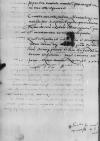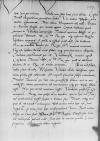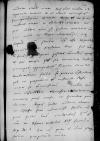Nova huc per nuntium ⌊Valachi⌋ non satis laeta sunt allata. ⌊Caesarem Turcarum⌋ tripartitum exercitum habere, uno contra ⌊Sophi⌋, alio contra ⌊Germanos⌋, tertio contra ⌊Hungaros⌋ uti velle. Pontem in ⌊Danubio⌋ fecisse, quo minore negotio copias traducere queat. Arcem in ⌊Valachia⌋ exstruxisse, ⌊Tartaris⌋ negotium dedisse, ut popularentur diciones
sacrae
⌊maiestatis regiae⌋ utque castrum Baczlaw obsidione cingerent, si potiti eo essent, quod absit, sibi traderent. Haec ex mandato ⌊domini sui⌋ ⌊regiae maiestati⌋ nuntius narravit. Neque est habita dictis eius fides neque prorsus etiam abrogata. Certiora exspectamus per dominum ⌊Vielamowski⌋ nuntium apud ⌊caesarem Turcarum⌋
sacrae
⌊maiestatis regiae⌋. Quod is attulerit, faciam de eo Reverendissimam Dominationem Vestram certiorem.
Ecce autem nova hodie sunt ab ⌊eodem waywoda Valachiae⌋ allata laetissima, quae vera quidem esse optamus, sed, ne quid fraudis subsit, metuimus. ⌊Turcarum tyrannum⌋ ex hac vita excessisse, ⌊filium⌋ eius in acie cecidisse, totum exercitum ad internecionem usque per ⌊Sophi⌋ deletum esse. Haec pro certis nuntiari iussit ⌊Valachus⌋ ⌊praefecto Camieniecensi⌋ atque una petiit ab eo auxilia, quo in hac rerum Turcarum perturbatione possit exigere e dicione sua ⌊Turcas⌋ atque arcem, quae ab eis munitur, intercipere. Sed omnia nobis hoc tempore sunt suspecta, si vera sunt haec, confirmabuntur brevi. Faxit autem Deus, ut vera sint. Sacra ⌊maiestas regia⌋, Deo sit gratia, bene autem, meliuscule potius valet. Fuit certe in maiore periculo quam anno superiore. Deus nos adhuc respicit.
Nuntiata erant ante tres dies multa de apparatu Turcico et de illius adversus ⌊Hungariam⌋ conatu. Qua de re huc missus erat a ⌊Valacho⌋ orator, sed heri aliter rem se habere oratoris nostri, qui redit a Turco,
<litterae>
docuerunt. Ex ⌊Leopoli⌋ enim scribit non esse tripartitos exercitus, ut ferebatur, ⌊Turci⌋, sed tantum in finibus ⌊Hungariae⌋ positas nonnullas copias. Ex hac causa, quod sit nuntiatum Christianos principes oppugnatum ⌊Turcam⌋ venire, ⌊Barbarossam⌋ scribit se parare ⌊Constantinopoli⌋ et propediem cum instructa classe mari se commissurum. Scribit tunc, cum discedebat, venisse oratorem Venetum pacis causa et speratur pacem obtinere. ⌊Regis Galliae⌋ nuntium etiam in discessu suo advenisse scribit, is petit fidei litteras oratoribus serenissimi ⌊domini nostri⌋ et ⌊caesareae catholicae maiestatis⌋ simul cum ⌊rege Romanorum⌋. Haec non potui domino ⌊duci Prussiae⌋ scribere properante nuntio.




